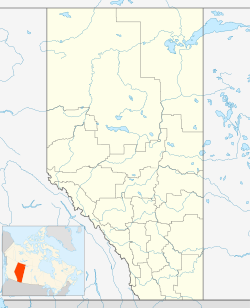Warner, Alberta
| Warner | |
|---|---|
| Village | |
| Village of Warner | |
| Nickname(s): Home of the First Last Elevator Row In Alberta | |
| Location of Warner | |
| Coordinates: 49°16′00″N 112°12′00″W / 49.26667°N 112.20000°W | |
| Country |
|
| Province |
|
| Region | Southern Alberta |
| Census Division | No. 2 |
| Municipal district | County of Warner No. 5 |
| Incorporated | |
| • Village | November 12, 1908 |
| Government | |
| • Mayor | Tyler Lindsay |
| • Governing body | Warner Village Council |
| Area (2016) | |
| • Land | 1.16 km2 (0.45 sq mi) |
| Elevation | 1,021 m (3,350 ft) |
| Population (2016) | |
| • Total | 373 |
| • Density | 321.6/km2 (833/sq mi) |
| Time zone | MST (UTC-7) |
| Highways | 4, 36, 505 |
| Website | Official website |
Warner is a village in southern Alberta, Canada. It is located in the County of Warner No. 5, approximately 65 km south of the city of Lethbridge. Warner is a farming community. Warner is situated at the intersection of Highway 4 and Highway 36, about 38 km north of the Montana border and Interstate 15. Warner's nearest neighbours are the towns of Stirling and Milk River.
The village is home to the Warner Hockey School, one of the premier girls' hockey schools in Canada. It is also home to the Devil's Coulee Dinosaur Heritage Museum.
In the 2016 Census of Population conducted by Statistics Canada, the Village of Warner recorded a population of 373 living in 172 of its 196 total private dwellings, a 12.7% change from its 2011 population of 331. With a land area of 1.16 km2 (0.45 sq mi), it had a population density of 321.6/km2 (832.8/sq mi) in 2016.
In the 2011 Census, the Village of Warner had a population of 331 living in 161 of its 190 total dwellings, a 7.8% change from its 2006 population of 307. With a land area of 1.15 km2 (0.44 sq mi), it had a population density of 287.8/km2 (745.5/sq mi) in 2011.
The population of the Village of Warner according to its 2011 municipal census is 392, a 2.3% increase from its 2007 municipal census population of 383.
In 2006, Warner had a population of 307 living in 171 dwellings, a 19.0% decrease from 2001. The village has a land area of 1.15 km2 (0.44 sq mi) and a population density of 267.6/km2 (693/sq mi).
...
Wikipedia

